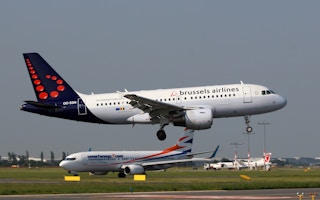The Europe Union should exert its right to impose carbon charges on aviation within its own airspace, the European Commission said on Wednesday, a step likely to rile emerging powers China and India and revive trade tensions.
A major retreat from previous legislation, the proposal from the Commission, the EU executive, might fail to satisfy critics both inside and beyond the European Union.
Following a United Nations deal struck in Montreal this month to set up a global scheme to curb aircraft emissions, the European Commission has to review its own law making all aviation buy into its Emissions Trading Scheme (ETS).
Climate Commissioner Connie Hedegaard has welcomed the U.N. deal, saying it would never have happened without EU pressure. But it will only take effect from 2020.
For the period 2014-2020, she is proposing an interim scheme that would cover EU airspace, rather than entire flights into and out of EU airports.
“It is a sovereign right to regulate aviation in and around our own EU airspace,” Hedegaard told reporters on Wednesday. “I very much hope our partners will see this in the spirit in which it is being presented.”
When the original EU law covering emissions for entire flights in and out of the European Union took effect in January last year, it triggered threats of a trade war.
Non-EU nations, led by India, China and the United States, complained the European Union was breaching national sovereignty and forced the bloc to freeze its law for a year to give the International Civil Aviation Organization (ICAO), a U.N. body, the chance to deliver a global alternative.
India, together with China, refused to comply with the EU law even before the decision to freeze it and haggled in Montreal for a further dilution of the agreement. China blocked delivery of European Airbus jets in protest at the EU law.
Back to trade wars?
Speaking in Brussels last week, one of the ICAO negotiators said charges on non-EU airlines would be a problem.
“If the EU decides, and I hope they do not, they will nevertheless want to capture emissions of non-European airlines, then we will be back to trade wars,” said Abdul Wahab Teffaha, Secretary General of the Arab Air Carriers Organization.
Members of the European Parliament, which together with the EU’s 28 member states would have to approve the Commission proposal for it to become law, have also raised objections, saying the Montreal agreement is empty.
It leaves decisions on details of the market-based mechanism until the next general assembly of ICAO in 2016.
Unless the parliament quickly approves the Commission’s proposal - ahead of parliamentary elections and a change-over of commissioners in 2014 - the existing EU aviation law will resume effect.
Peter Liese, a German Christian Democrat who steered the original law through the European Parliament and led the debate on the “stop the clock” one-year suspension, said he was disappointed with the Montreal deal.
“The European Parliament will thoroughly examine the proposal and amend our regulation if need be,” he said.
“If the European Parliament does not agree with the Council (of member states) on a new legislative text by April, legislation as originally planned will come into force for intercontinental flights taking off and landing in Europe. This pressure medium remains.”
He also said it was indispensable to include all flights using EU airports for the part they travel in European airspace to be fair to European airlines.
Environmental campaigners strongly criticized the ICAO deal and were also unhappy on Wednesday, saying the Commission’s proposal would cover only 35 percent of aviation emissions compared with the original EU law.
“It is disgraceful that foreign and industry pressure has obliged Europe to shrink its own aviation emissions law to the bare minimum,” Bill Hemmings, aviation manager at Transport & Environment campaign group, said.
“This is a grey day for the climate and for those that are serious about tackling aviation’s fast-growing warming impact.”










